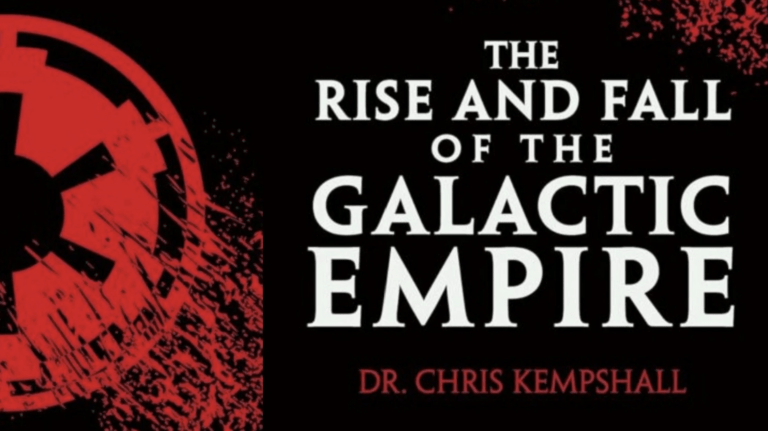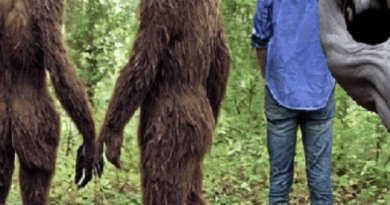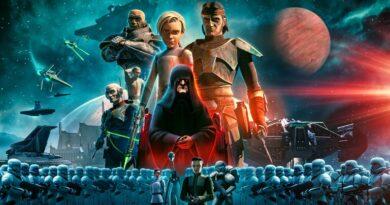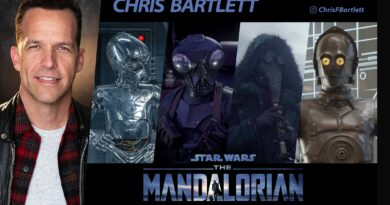Star Wars: The Rise and Fall of the Galactic Empire author Chris Kempshall talks about the book’s core message and much more with SciFiction
‘Star Wars: The Rise and Fall of the Galactic Empire’ is a fantastic book by Dr Chris Kempshall, an in-universe history of the most famous and consequential organisation in all of ‘Star Wars’, the Galactic Empire. In this interview with SciFiction, Chris spoke about the importance of writing with Beaumont Kin’s voice, how he approached research, his core message, and those image captions.
One of Chris’ first jobs was finding the right narrator. He knew that it had to be a character that was a recognised historian, as he said “that would give them all of the institutional approaches to history that wouldn’t need to be explained.”
He added that while post-’Rise of Skywalker’ Han Solo is dead, “Han couldn’t have been the author of the book, because you’d spend too much time explaining why Han Solo is acting like a historian.”
Taking a pre-existing historian allowed Chris to sidestep this. “Historian writes book is not front page news in our galaxy or the ‘Star Wars’ galaxy,” he said.
Chris also knew he wanted to set the book after ’The Rise of Skywalker’ which would allow him to explore the Empire with a defined tension. This made the existence of the historian Beaumont Kin perfect.
“It was clear right away this was the guy. This is who is gonna be the person to do this. And he’s gonna approach this with that necessity.”
After finding the right character, Chis could begin researching. ‘Star Wars’ though is a vast franchise, especially when talking about the Galactic Empire. To help give the him some structure, Chris first agreed chapters with DK and Lucasfilm.
Then Chris could start writing. “I did 4 or so chapters each month. Whilst I was doing that I’d send a list of questions relating to the topics of the next 5 chapters off to Lucasfilm in advance, so when I submitted my written chapters their responses to my questions came back down the line,” he said.
Chris praised the help the Story Group gave with researching the mammoth universe of ‘Star Wars’, and for allowing him to hint at new releases yet to come.
“The amount of heavy lifting the Story Group must have had to do with those lists of questions, like so many random questions about industry, or music, or culture. Or, I’m looking for an Imperial officer who could fulfil this role”
He added “lt’s such a wild, mad spread of stuff.”
The process also showed Chris that the Empire is still a foreign entity to fans.
“The other really interesting thing, that I was aware of on the way in, but it becomes more pronounced as I went on, is how much we don’t actually know about the Galactic Empire,” he said.
Audiences have build up an assumed knowledge of the Galactic Empire over time, but it left gaps that had to be filled.
Chris gave an example of education. “Yeah, the Galactic Empire probably does brainwash children through propaganda in their schools. But have we ever actually seen that happen?”
This meant that Chris and the Story Group had to create a new lore to expand for the Empire along with case studies. But the new information couldn’t constrain future creators.
“It also has to be not so specific or all-consuming that in 10 years time, someone who’s working on a comic or a TV show isn’t handcuffed to like the book the weird historian wrote 10 years ago,” he said.
“It was a real collaborative effort between me, DK, Lucasfilm, and the Story Group to pull all of these little hints of stuff together and build stuff to fill in the gaps.”
Chris’ background as a historian meant he’d already read many history books, allowing him to draw on many authors.
“People will kind of tend to go towards some obvious examples. Maybe they’ll think about ‘The Decline and Fall of the Roman Empire’ by Edward Gibbon or ‘The Rise and Fall of the Great Powers’ by Paul Kennedy and stuff like that. In my head, I was drawing on a wide historiography of social history and cultural history,” he said.
“There’s a really interesting long history of writing this kind of rise and fall, decline and fall type of grand narrative history, that this kind of work in the ‘Star Wars’ universe can tap into.”
Chris also explained that while he focuses on the First World War history in his day-to-day life, his research encompasses cultural, economic, and political history, not just dates of battles, which helped in his approach for ‘The Rise and Fall of the Galactic Empire’. This defines the Empire as much as the fighting.
“These massive events, they’re not just a bunch of, you know, soldiers hitting each other with heavy things. They exist as the the final point of all of the societal aspects that come before them, so that historian background for me was really, really useful.”
Accompanying the in-universe text, are several images audiences will recognise from across ‘Star Wars’, but all have in-universe citations. Beaumont Kin hasn’t seen ‘A New Hope’ after all. This took some tinkering, as not just any images could be included.
“Understanding why those images make it into the book was quite important for us. Pictures of meetings were good, meetings are the type of thing the bureaucratic Empire would keep. The Rebel Alliance would probably keep pictures of some of their key meetings.”
Chris highlights the inspiration he and Lucasfilm took from our world, such as companies having pictures of their products, and looking at how images were recorded from 20th and 21st century battles.
“We know images are recorded from gun cameras or documentarians on the border. So we can play around with that as well with the little in-universe captions. We spent a little bit of time kind of playing around with those to make sure that it felt right,” Chris explained.
This drive for accuracy added another layer of authenticity to the book. Chris also pointed to his favourite image, highlighting the benefits of out-of-universe knowledge.
“I really like the Luthen Rael one where the Empire thinks this is Axis. We know it is because we’ve seen ‘Andor’, but Beaumont Kin hasn’t watched ‘Andor’, so it could just be a guy walking down the street,” he said.
This photo of Luthen in particular spawned fan speculation of the identity of the ISB Agent who snapped a photo of Luthen on Ferrix on X, something that Chris found endearing.
While there is definitey fun to be had with the photos, Beaumont Kin, and by extension Chris, wrote ‘The Rise and Fall of the Galactic Empire’ with an important message about the Empire in mind. Its leader, Emperor Palpatine, despite his ability to shoot Force Lightning, is largely irrelevant.
“He’s also that type of person you’re ever gonna meet. He’s not manning a border point. He’s not checking your tax return. He’s not kicking your door in at 3:00am in the morning. Who cares about Emperor Palpatine,” Chris said.
“The Empire is what you should be concerned about, and the Empire is made up of so many other people that are doing these things in this system that allows them.” he added.
One of the ways this is demonstrated in ‘Star Wars’ is through Operation Cinder, after Palpatine’s supposed death.
“‘The Emperor is dead, but he gave me a last order to commit an atrocity,’” Chris said, mimicking an Imperial Officer.
“Another way of looking at it is that a dead man told me to do it. What’s the repercussions if I ignore the dead man’s order? Those people did it because they wanted to. In a way they’re far more than the Empire than Palpatine is,” he added.
This sharp message ties into Chris’ favourite chapters, though he stressed he likes them all for different reasons. Focusing on chapters 12 and 13, Prejudice and Discrimination, and Atrocities and Genocide, Chris explained that those two were key to get right, and bring home what the Empire truly is.
Those chapters showed “the natural endpoint of everything that the Empire is.” Chris said.
He further explained “For people in-universe, this is the reality of what the Empire is, but also I think it’s important for for us outside of the universe to realise the Empire might actually be worse and more horrifying than we’d ever really accepted and understood on our on our purely logical level, and it was important to me to have that laid out.”
It’s a sobering read, and is just another way that Beaumont Kin and Chris have recontextualised the Empire and ‘Star Wars’ universe as a whole. It’s a must read for ‘Star Wars’ fans because of this, especially ones that appreciate the political and historical side to the universe.




